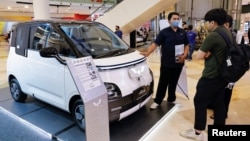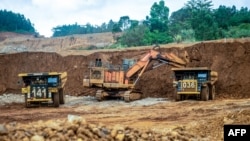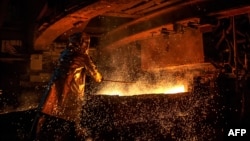Indonesian President Joko Widowo is accelerating his plans to position his nation as a global hub in the electric vehicle production ecosystem, an ambition coming into clearer focus as he courts more Chinese investors.
He and the Indonesian Chamber of Commerce met with Chinese CEOs in Chengdu as part of the effort to create a downstream nickel industry. The Indonesians’ goal is to attract Chinese mining companies to establish more smelters for nickel ore.
Indonesia is the world’s largest producer of nickel, which is essential for making the lithium-ion batteries used in EVs. China is the world’s largest EV battery producer.
"Currently, we want to prioritize investments in building an electric vehicle ecosystem," Widodo told the CEOS, explaining this would start with mining and include manufacturing batteries and electric vehicles. He estimated that Indonesia could produce a total of more than 2.4 million electric vehicles, including cars and motorbikes, by 2035.
Widodo’s administration included EV production in its National Masterplan for Industry 2015-35 and specified EV infrastructure development in its National Medium-Term Plan 2020-24.
At the Chengdu meeting, he emphasized the Indonesian government’s willingness to provide a problem-free process for Chinese investors. They face widespread anti-China sentiment in the country in addition to infrastructure limitations and a daunting bureaucracy.
"I hope that if there are issues in the field, whether related to land acquisition or permits, please disclose them," the president said, according to the Foreign Ministry.
Andry Satrio Nugroho, an economist at the Jakarta-based Institute for Development on Economics and Finance, said previous Indonesian presidents were more inclined to build strong economic ties with the U.S., but under Widodo’s leadership relations with China have been stronger.
After his 2014 election, Widodo’s first official international trip was to China and Japan “to secure financial and technical support for his domestic infrastructure and industrial development plans,” according to an April 2023 report by the Carnegie Endowment for International Peace.
China is Indonesia’s biggest trading partner and a major source of investment. Last year, Indonesia’s exports to China were $65.9 billion while imports were $67.7 billion, according to the Indonesian government’s statistics agency. China was the second-largest source of investment in Indonesia in 2022 with $8.2 billion, behind Singapore with $13.3 billion, according to data released by the Indonesian Investment Coordinating Board.
And with a population of 278 million, Indonesia also represents a substantial potential market for China’s EV manufacturers.
Nugroho said that despite Indonesia’s ambition to be one of the world’s largest EV manufacturing hubs, he believes the country is not yet able to develop a comprehensive supply chain for electric vehicles. This makes it even more important that the government ensures China adheres to its commitment on technology transfer before Indonesia runs out of its nickel reserves — expected in less than 20 years.
Nuki Agya Utama, executive director of the ASEAN Center for Energy, agreed that Indonesia needs China to transfer its technology for processing minerals.
But Nugroho said, “I actually think the existing incentives offered to build an EV ecosystem [are] quite excessive.”
According to the Economist Intelligence Unit, the Indonesian government has EV-related industries eligible for special fiscal treatment such as “multi-year tax holidays and import duty exemptions, depending on the level of investment and whether goods are earmarked for export or domestic sale.”
Jakarta officials and local governments are open to negotiations on incentives related to land and infrastructure, according to the EIU.
Nugroho added there is a streamlined process for issuing work permits for Chinese workers and “even direct flight routes from Sulawesi to China to transport thousands of Chinese laborers to Morowali.”
Widodo’s push for more Chinese investment highlights Indonesia’s moratorium on mineral ore exports introduced on January 1, 2020. It requires that all raw nickel mined in Indonesia must be processed domestically. This means local jobs and higher value-added export revenues.
Indonesia holds the world's largest nickel reserves with an estimated 21 million tons, which roughly accounts for 22% of known global reserves. More than a dozen nickel ore smelters in Indonesia process the mined nickel. Chinese investors are behind many of the mines and smelters. Among Chinese investments, ventures by the Tsingshan Group are the largest, in part because as the world’s leading stainless steel producer, it must have access to a steady supply of nickel.
The corporate watchdog, Business & Human Rights Resource Centre, has identified 102 alleged abuses in 2021 and 2022 linked to Chinese mining interests in 18 countries. Indonesia had the most alleged abuses at 27.
Antonia Timmerman, an editor for the website China Global South Project, has investigated Chinese involvement in Indonesia’s nickel mines.
“This is a dirty business,” Timmerman said in The Guardian. In Indonesia, for example, the government “can be very brutal when it comes to defending and protecting these companies, especially the large ones. This happened long before the EV phenomenon.”
Two Indonesian workers died in December at a Chinese-owned smelter. A month later, an Indonesian and a Chinese worker died during protests over safety conditions.
VOA Indonesia contacted the Chinese Embassy in Jakarta for comment on Chinese investments in the EV ecosystem only to be told officials there lacked the authority to respond.
VOA Indonesia also contacted BYD Company, Tsingshan Steel and Weda Bay Nickel. The first two are Chinese enterprises operating in Indonesia’s EV ecosystem. Tsingshan Holding Group has a majority interest in Weda Bay. None responded.
In February, Widodo announced his goal for Indonesia to become one of the top three producers of EV batteries by 2027.
In April, the Indonesia Investment Authority began setting up a special fund, the EV Ecosystem Fund, with Chinese battery giant Contemporary Amperex Technology to help develop the emerging industry.
In just three years, Indonesia has signed more than a dozen deals worth more than $15 billion for battery materials and electric vehicle production with manufacturers including South Korea’s LG and Hyundai, and Taiwan’s Foxconn.
For more than a year, there have been press reports of Tesla reaching a deal to establish an Indonesian presence in the nickel industry and EV battery production.
Indonesia’s coordinating minister for maritime and investment, Luhut Pandjaitan, is expected to meet with Tesla’s Elon Musk in August to discuss investments in Indonesia.
South Korea's Hyundai opened the first electric car assembly plant in Indonesia in March 2022. Built on an existing conventional vehicle factory in Cikarang, close to Jakarta, it produces the IONIQ 5 and has an annual capacity of 250,000 vehicles.
Also in Cikarang, which has road and rail freight access to the nearby Tanjung Priok seaport, Indonesia’s DFSK and China’s Wuling Motors have produced 5,251 units in Indonesia this year as of the end of May. This includes DFSK Motor’s popular electric minivan, Gelora E; and Wuling’s city car, the Air EV. Last year, almost 8,000 electric cars were sold in Indonesia, most of them by Wuling.







